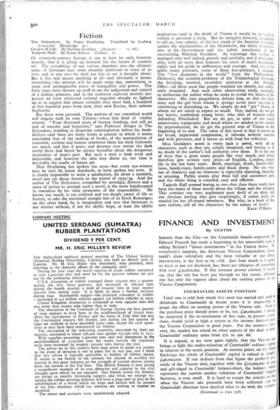Fiction
The Defenders. By Franz Hoellering. Translated by Ludwig Lewisohn. (Routledge. 9s.) OF twentieth-century Europe it can at least be said, however wearily, that it is piling up material for the future of creative art. The assemblage of our various shambles into the ultimate order of literature may seem absurdly irrelevant to some of us now, and in any case we shall not live to see it brought about. But if this war means anything at all—and obviously it means everything—the attempt will be made some day, somewhere, in some now unimaginable pause of tranquillity and power. The forty years have thrown up stuff to tax the judgement and control of a million geniuses, and in the confused eighteen months just passed we have witnessed isolated tragedies already so lighted up as to suggest that almost certainly they must find, a hundred or five hundred years from now, their new Racine, their unborn Sophocles.
But these were personal. The nations of our convulsed world will require each its own Tolstoy—when that kind of vitality returns. " Four thousand years of human thinking, and still no end of murder and hypocrisy," says Professor Steiger in The Defenders, standing in desperate contemplation before his book- shelves—and 'here are many hours at present in which it seems concluded that of the making of books, of the manipulation of comment, surmise and human sentiment there has been hideously too much, and that if peace and decency ever revisit the dark world there had better be silence hereafter about the dangerous inspiration of man's past. But such a wish is both weak and impossible, and however the idea may alarm us, our time is inevitably the cradle of future art.
Herr Hoellering has spoken too soon—but every eye-witness may be said, by truest standards, to have spoken too soon. It is clearly impossible to write a satisfactory, let alone a masterly, novel just yet about Austria in the winter of 1933/34. And the author of The Defenders, compelled by nostalgia, distress and a sense of justice to attempt such a novel, is the more handicapped in execution by his clear awareness of the impossibility. He knows too much, is too civilised and too deeply aware of life as history, to take the emotional straight line of an Erich Remarque; on the other hand, he is imaginative and sees that literature is not written without, if not the idyllic hope, at least the idyllic inspiration—and in the death of Vienna it would be dithcult to sustain so personal a thing. But be struggles forward, compelled to tell us, very soberly, of the last stand of the Austrian Socialists against the machinations of the Heimwehr, the shifty relentless- ness of the Government and the subtle treacheries of the encroaching National Socialists. As reportage this outline is managed very well indeed, gravely and carefully, and if with pani_ ality, with no more than honours his sense of man's inalienable rights and his pride in selflessness and courage. And into it he grafts many portraits, some of them key-portraits, I imagine. The " best drummer in the world " from the Philharmonic Orchestra, the scientist-professor of the Technological Institute, the finicking, worried, ex-soldier aristocrat at the Foreign Office—all these seem like people watched too closely, not suffici- ently imagined. And such sober observation tends, naturally, to embarrass the author when he seeks to reveal the hearts of his characters. His own gingerliness defeats him, so that the love- story and the girl from whom it springs never once succeed in convincing or disturbing us. We simply do not " get " Maria, of whom we are 'asked to expect so much. Nor, indeed, do we get her heroic, symbolical young lover, who dies of wounds taken defending Floridsdorf. But we do get, in spite of too much unnecessary topography and detail where we needed to be carried by impressionism, we do get the general woe of Vienna at the beginning of its end. The value of this novel is that it moves us by broad, impersonal compassion, it informs without rancour and with precision, and it leaves us with food for reflection.
Miss Goolden's novel is every inch a novel, with all its characters, such as they are, crisply imagined, and leaving us in no doubt of the author's full authority over them. It is the sort of story that a great many people like very much, and which therefore gets written very often—of English, London, family life in the last forty years. Birth, marriage, death, family-affec- tions, family-tears, family-saints and black sheep. No one steps out of character and no character is especially alarming, beautiful or amusing. Public events play their full and customary part, and the whole thing is rounded, easy and efficient.
Tadpole Hall seemed boring to me—but then there really have been too many of these novels about the village and the refugees. This contains one very unpleasant poor devil of an alien, and one absolute darling who gets surprisingly, if rather dully, re- warded for her all-round sweetness. But why, in a book of flat, neat realism, call all the characters by the names of birds?
KATE O'BRIEN.






































 Previous page
Previous page